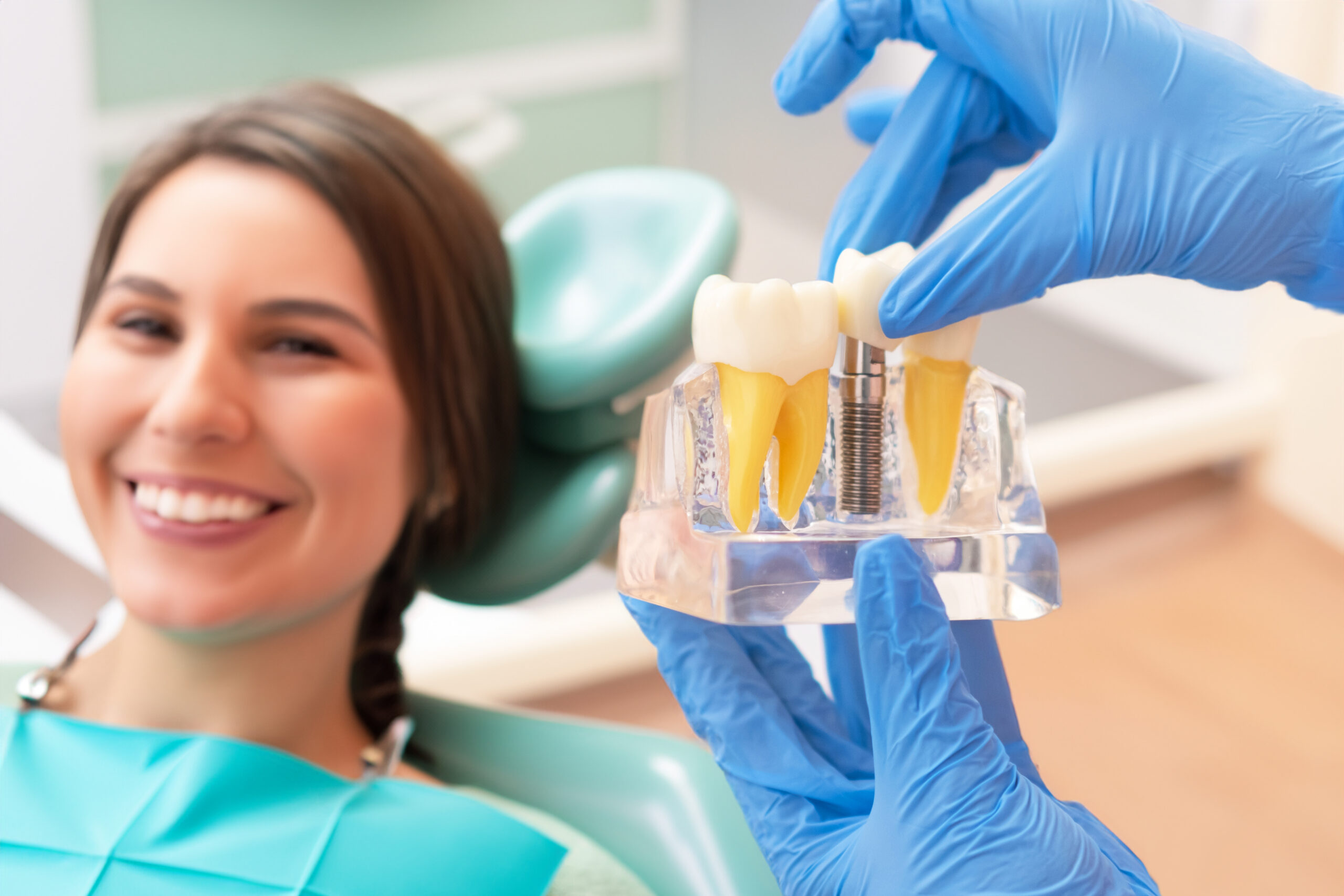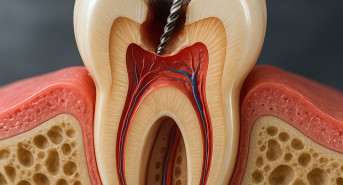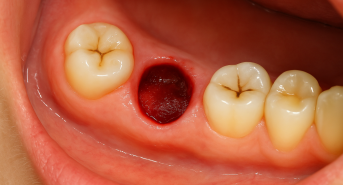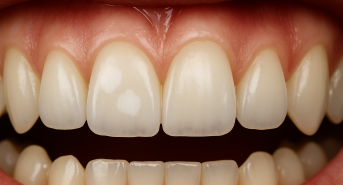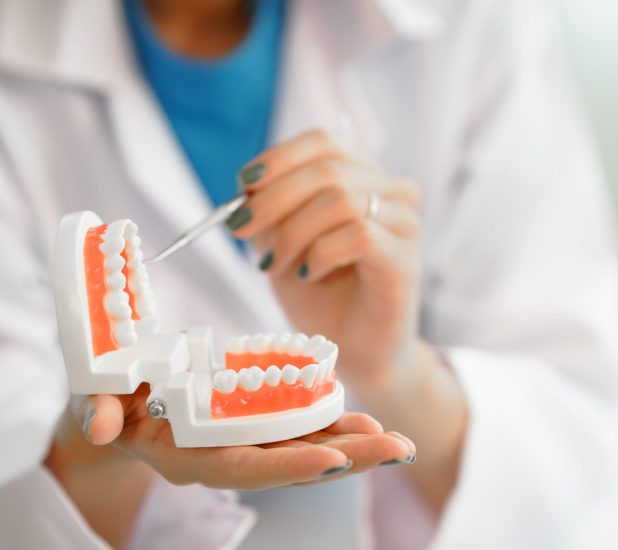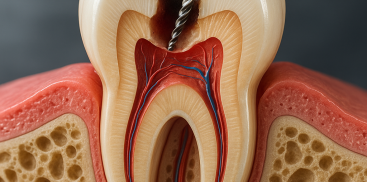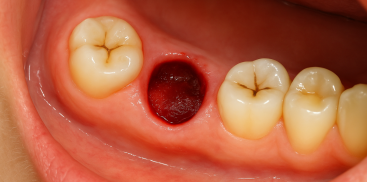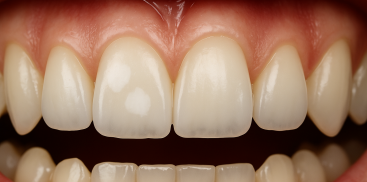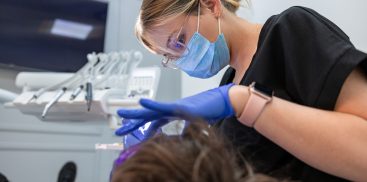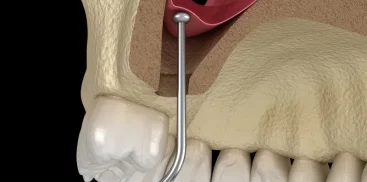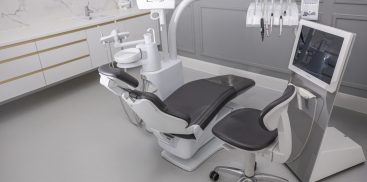Bacterial infection around an implant often manifests as redness and bleeding of the gums during tooth brushing. This process, involving both soft tissues and bone, starts with gingival inflammation (mucositis) and can then progress to bone damage (peri-implantitis). It is often accompanied by pain, bad breath, gum swelling, and pus formation around the implants.
Untreated peri-implantitis can lead to various complications such as implant mobility, bone loss, and even implant loss necessitating prosthetic replacement.
Causes of soft tissue inflammation around dental implants
Based on years of research, it can be conclusively stated that bacteria are the primary cause of inflammation of soft tissues around implants. In addition, other factors influencing the prognosis of implant treatment and the integration process of the implant, such as systemic diseases (e.g., diabetes) and malocclusion or excessive stress, also play a role.
However, it is usually pathogenic microorganisms, forming dental plaque, that have an adverse effect on the oral tissues surrounding the implant. Improper hygiene after implantation surgery is the main factor responsible for the bacterial-induced inflammatory condition. Unfortunately, many patients, due to factors such as inadequate brushing, poor oral hygiene, and excessive smoking, create ideal conditions for tissue diseases.
Oral health
Oral health serves as the most effective protective barrier against inflammation around the implant. It is essential for patients to consistently care for dental implants both immediately after the procedure and during continued use. Perfect oral hygiene is the best prevention against potential complications following implantation.
Therefore, it is crucial to remember the following:
- Regular hygienic and follow-up visits to the dental surgeon allow for the early detection of any tissue inflammations around the implant and appropriate treatment.
- Implementing preventive measures, such as regular use of irrigators, dental floss, and mouth rinses, is crucial. Especially in the first two weeks after the procedure, it is recommended to use rinses containing chlorhexidine, known for its long-lasting antiseptic properties.
- For patients having difficulty with thorough oral cleansing, switching from a manual to an automatic (electric/sonic) toothbrush is worth considering. Such a toothbrush, combining pulsating and sweeping movements, minimizes the risk of plaque formation, which is particularly beneficial for the health of the mandibular and maxillary teeth.
- Individuals using prosthetic appliances should pay special attention to hygiene, as bacteria transferred from prosthetics can lead to tissue inflammation around the implant, disrupting the integration of the implant with the bone.
- To improve tissue healing processes, Platelet Rich Fibrin (PRF) is often collected before implantation – a high-quality, platelet-rich fibrin derived from the patient’s blood plasma. This solution can accelerate healing processes and stimulate bone regeneration around the implant.
Can tobacco smoking affect tissue inflammation and wound healing process after implantation?
Certainly, tobacco smoking has an adverse effect on the osseointegration process, i.e., the bonding of bone with the implant. In smokers, wound healing after surgery can be significantly slower, and tissue ischemia around the implant may occur.
Smokers experience changes in oral microflora, accelerating inflammation around the implant, mainly due to the presence of anaerobic bacteria. Nicotine-dependent individuals should be aware of how smoking affects the treatment process and that it can lead to implant failure.
Studies conducted worldwide have shown that individuals smoking more than 10 cigarettes a day account for over 53% of those suffering from peri-implantitis. This information demonstrates the significant problem of nicotine addiction. Moreover, such patients often experience chronic inflammation of the oral mucosa, delayed healing around implants, and significant biofilm occurrence, leading to bacterial growth and, consequently, may require implant removal.
Doctors urge patients to quit smoking! Unfortunately, many patients are unaware of how negatively addiction affects implant treatment and disrupts the bacterial environment of tissues.
Research speaks for itself
As evident, before proceeding with implantation, it is recommended that patients undergo a series of tests assessing the mineral levels in the body. Even during treatment planning, there is an opportunity to reduce the risk of inflammatory conditions and dental implant failure.
In dental practice, besides clinical examination, laboratory tests play a significant role. Based on a thorough assessment of laboratory diagnostics, an experienced implantologist can not only minimize the risk of complications in dental treatment but also detect systemic diseases in time.
